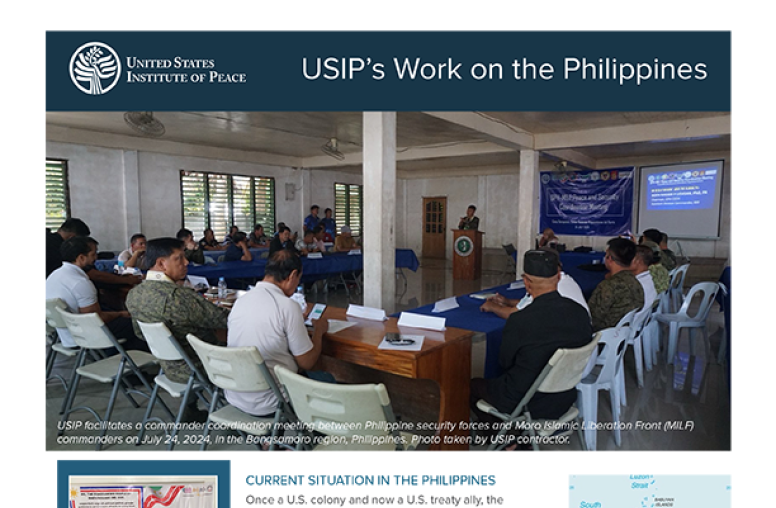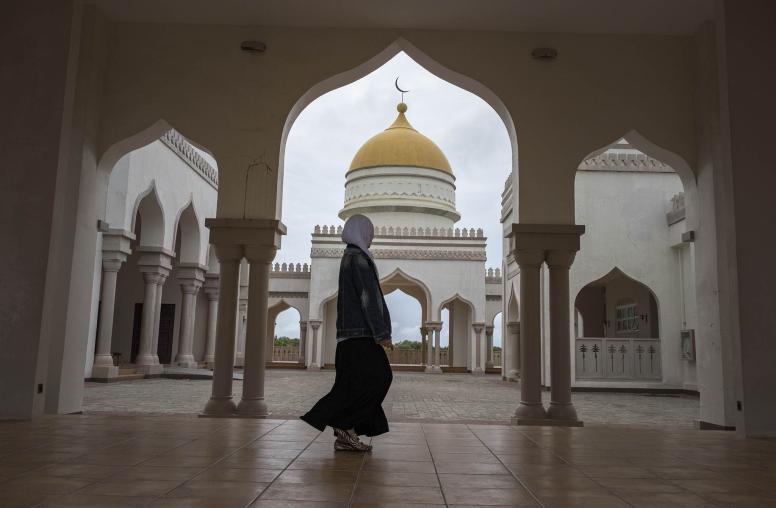Brian Harding on Renewed U.S.-Philippines Ties
Philippine President Marcos’s visit to Washington has helped usher the U.S.-Philippines relationship into “a new renaissance,” says USIP’s Brian Harding. And with growing concerns over Beijing’s influence in the Pacific, “[Marcos] is making a bet that if he deepens this relationship … that is how he’s going to deter China.”
U.S. Institute of Peace experts discuss the latest foreign policy issues from around the world in On Peace, a brief weekly collaboration with SiriusXM's POTUS Channel 124.
Transcript
Laura Coates: We're joined now by Brian Harding, a senior expert for Southeast Asia and Pacific Islands at the United States Institute of Peace. He tweets at @iambrianharding. Brian, welcome. Good morning. How are you?
Brian Harding: I'm very good. Good evening from Jakarta, Indonesia.
Laura Coates: Oh, my goodness. Well, it's a good morning from Washington, D.C. So, tell me how the day goes since you now are in the future. Let us know what news we're going to learn about today. But before you do talk to us about President Ferdinand Marcos and a week of Washington meetings that took place on what's going on?
Brian Harding: Yeah, I mean, first of all, you know, we should recognize that for Americans of a certain age, it must be a pretty amazing sight to see a Ferdinand Marcos this time, Ferdinand Marcos, Jr. back at the White House. I mean, this is an incredible turnaround and political fortunes as father, a dictator who was pushed out by a major people power revolution in 1986. Times have really changed his son's back in the White House and really throwing the U.S.-Philippians relationship into a new renaissance. It's pretty incredible.
Laura Coates: So, tell me about what has evolved to make this possible and what happened?
Brian Harding: So, first of all, President Marcos has a pretty low bar to clear. The U.S.-Philippines relationship under President Rodrigo Duterte over the past six years, you know, really tried to bottom out as much as it could. But the U.S.-Philippine alliance, you know, turned out to be pretty resilient. If you look at polling in the Philippines, Filipinos like America more than Americans like America. They have deep suspicion of China, they have a territorial dispute in the South China Sea, their fishermen are being harassed. So, there's a real interest in deepening ties with the United States and Marcos is making a bet that if he deepens this relationship with the United States, he has recently accelerated the implementation of an arrangement that will allow for United States military forces to use more Philippine bases on a regular routine. He's making a bet that if he defends the alliances that he shows, speaks loudly about Chinese behavior in his own neighborhood, that that's how he's going to turn China. For the United States, this brings into view, you know, one of the key issues in U.S. foreign policy these days, to turn countering China, and the Philippines is an indispensable ally for the United States. It abuts the South China Sea, it's less than one hundred miles from Taiwan, really, geography is everything. So, for the U.S. military sitting at the Pentagon, where I used to work when they see that the President of the Philippines is here in Washington, offering access to Philippine facilities, this is really good news for U.S. posture, visa vie China.
Laura Coates: So, what was the goal of these conversations?
Brian Harding: So, this was really capping, or pretty momentous six or seven months, you had the Secretary of State, Secretary of Defense, Vice President visiting Manila. So, this is really, you know, going the other way and showing that the top two leaders, Biden and Marcos are on the same page. For Marcos though, you know, he needs something, he gets something political out of this. So, he's you know, given the United States and the Pentagon more than I think anybody could have imagined. You know, he came looking to broaden out the relationship, what sort of what economic gains is he going to get for, for helping deliver on some of the U.S. security interests, which are mutual security interests, as well. It remains to be seen; President Marcos says he got $1.3 billion of investments a lot of his schedule while he was in Washington for four days was with U.S. businesses. President Biden is sending the Commerce Secretary back out to Manila with a what they're calling a presidential trade and investment mission. So, it remains to be seen. Presidents in the Philippines have six-year terms, Marcos is eight months in, things are incredibly good. We'll see where it goes.
Laura Coates: Now, he did Marcos did visit Beijing earlier this year right? What was going on there? And what was the purpose? And how does that impact our relationship with the Philippines now?
Brian Harding: Yeah, well, geography is everything, China's their big neighbor and Manila does need to balance its relationship between the United States and China. It just can't go entirely all in on the relationship with the United States and this is the same for everybody in the region. Even countries like Singapore and Vietnam, where there's very clear concerns about China interest in leading into the relationships with United States they still need to deal with China. There's a lot of money to be made here too. So, the Philippines actually lags compared to its neighbors in terms of Chinese investment in the country. We would like to change that. So, it was important that Marcos make a visit to the neighbor to keep things on even keel. But I think you very clearly saw the direction they're looking to land based on the images we saw of Marcos and President Biden and the White House.
Laura Coates: So, Vice President Kamala Harris, I think visited right Secretary of State Antony Blinken, Secretary of Defense, Lloyd Austin as well, you know, was there a significant distinction between each of the meetings as to what the goals and sort of marching orders will be from here?
Brian Harding: Yeah, they've really built on themselves. And again, we're coming out of a giant trough underneath President Rodrigo Duterte six years where he personally had some real extreme anti-American sentiment, he tried to distance himself in the country from the United States, cozying up to China. And so, we're really just bouncing back in a lot of ways. And this was the capstone, I think, this week. But the centerpiece really has been the deepening and institutionalization of the defense relationship between the two countries. The United States, signed with the Philippines almost 10 years ago an agreement to access Philippine bases to build and store U.S. material there. It was really slow going and now I think we're going to see some real progress and we're never going back to the days of Subic Naval Base and Clark Air Force Base, which is, you know, during the Cold War, where the United States' largest overseas presence anywhere in the world, were in the Philippines. We're not going back to that, but certainly a new era for U.S.-Philippines defense relations.
Laura Coates: Really helpful understanding what happened, Brian Harding, thank you for joining the show today. I appreciate it so much.
Brian Harding: Likewise.



